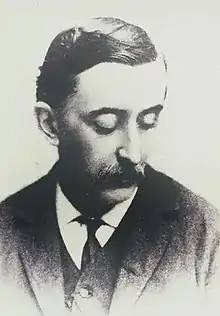Japanophilia
Japanophilia is the appreciation of Japanese culture, people and history.[1] In Japanese, the term for Japanophile is "shinnichi" (親日), with "親" equivalent to the English prefix 'pro-' and "日", meaning "Japan" (as in the word for Japan "Nihon" (日本)). The term was first used as early as the 18th century, switching in scope over time.

Early usage
The term Japanophile traces back to the late 18th and early 19th centuries before Japan became more open to foreign trade. Carl Peter Thunberg and Philipp Franz von Siebold helped introduce Japanese flora, artworks, and other objects to Europe which spiked interest.[2][3] Lafcadio Hearn, an Irish-Greek author who made his home in Japan in the 19th century, was described as "a confirmed Japanophile" by Charles E. Tuttle Company in their forewords to several of his books.[4] Others may include Jules Brunet, a French Army officer who played a famous role in the Japanese Boshin War.
20th century
In the first decade of the 20th century, several British writers lauded Japan. In 1904, for example, Beatrice Webb wrote that Japan was a "rising star of human self-control and enlightenment", praising the "innovating collectivism" of the Japanese, and the "uncanny" purposefulness and open-mindedness of its "enlightened professional elite." H. G. Wells similarly named the élite of his A Modern Utopia "samurai". In part this was a result of the decline of British industrial productivity, with Japan and Germany rising comparatively. Germany was seen as a threat and a rival power, but Japan was seen as a potential ally. The British sought efficiency as the solution to issues of productivity, and after the publication of Alfred Stead's 1906 book Great Japan: A Study of National Efficiency, pundits in Britain looked to Japan for lessons. This interest, however, ended after World War I.[5]
General José Millán-Astray, the founder of the Spanish Legion, stated that the samurai warrior code Bushido exerted a great influence on him. Defining Bushido as "a perfect creed", Millán-Astray said that "the Spanish legionnaire is also a samurai and practices the Bushido essentials: Honor, Valor, Loyalty, Generosity, and Sacrifice", and added that Spain would become a great power like Japan by adhering to the code's principles.[6] He also made a Spanish translation of Inazo Nitobe's book Bushido: The Soul of Japan and a prologue to it.[7]
21st century
In the early 2000s, derogatory slang terms were created to refer to people who appreciate Japanese popular culture. The term "wapanese" (from "white Japanese", or possibly also "wannabe Japanese") first emerged in 2002 as a derogatory term for a white person who is obsessed with Japanese culture, particularly anime and manga. The term "weeaboo" (later shortened to weeb) came from the webcomic The Perry Bible Fellowship, in which the word had no meaning other than it was something unpleasant.[8] According to an unpublished MA thesis, 4chan quickly picked up the word and applied it in an abusive way in place of the already existing wapanese term.[9]
Kim Morrissy of Crunchyroll wrote that the meaning of the word otaku is hindered by cultural appropriation, and that some westerners believe that it can only refer to a Japanese person, as the concept is not directly translatable and is a quintessentially Japanese phrase.[10]
In a blog post on Anime News Network, Justin Sevakis gives a difference between the two, saying that there is nothing wrong with loving Japanese culture. He points out that a person only becomes a weeaboo when they start to be obnoxious, immature, and ignorant about the culture they love.[11] Matt Jardin from the Alaska Dispatch gave an opinion on the definition saying that weeaboos blindly prefer things from Japan while looking down on anything else despite obvious merit.[12]
See also
- Japanization
- Japanification: cultural assimilation into Japanese society
- Japonism
- List of Westerners who visited Japan before 1868
- Japanese studies
- Cool Japan
- Japan Expo
- Anime club
- Pacific Movement of the Eastern World
- Sinophile
- Kent Gilbert
- Jingri
References
- "Japanophile". Webster's Third New International Dictionary, Unabridged. Merriam-Webster. 200. Retrieved 2016-02-21.
one who especially admires and likes Japan or Japanese ways
- William R. Johnston (1999). William and Henry Walters, the Reticent Collectors. JHU Press. p. 76. ISBN 0-8018-6040-7.
- Robin D. Gill (2004). Topsy-Turvy 1585. Paraverse Press. p. 25. ISBN 0-9742618-1-5.
- Hale, Heather (September 1990). "Lafcadio Hearn". Japanfile, the Website of Kansai Time Out Magazine. Archived from the original on 2016-03-05.
- Bruce Cumings (1999). "Archaeology, Descent, Emergence: American Mythology and East Asian Reality". Parallax Visions: Making Sense of American-East Asian Relations. Duke University Press. p. 25. ISBN 0-8223-2924-7.
- Jensen, Geoffrey (2002). Irrational Triumph: Cultural Despair, Military Nationalism, and the Ideological Origins of Franco's Spain. Reno, Nevada: University of Nevada Press. p. 150. ISBN 0874174813.
- Beeby, Allison; Rodríguez, María Teresa (2009). "Millán-Astray's Translation of Nitobe's Bushido: The Soul of Japan" (PDF). Autonomous University of Barcelona. Retrieved 6 June 2017.
- Chris Kincaid (2015-08-30). "Am I a Weeaboo? What does Weeaboo Mean Anyway?". Japan Powered. Retrieved 2016-02-21.
- Davis, Jesse Christian. "Japanese animation in America and its fans" (PDF). Retrieved 12 December 2015.
- Morrissy, Kim (August 22, 2016). "FEATURE: Found in Translation - The Evolution of the Word 'Otaku' [PART 1]". Crunchyroll. Retrieved August 26, 2016.
- Justin Sevakis (August 22, 2014). "Nobody Loves the Weeaboo". Anime News Network. Retrieved March 10, 2016.
- Matt Jardin (September 29, 2016). "Going to Senshi Con this weekend? Here are 5 terms to know". Alaska Dispatch. Retrieved May 18, 2017.